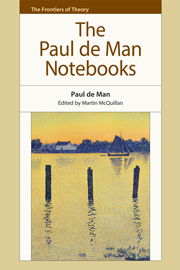Book contents
- Frontmatter
- Contents
- Series Editor's Preface
- Acknowledgements
- Dedication
- Introduction: ‘The Unimaginable Touch of Time’: The Public and Private in the Notebooks of Paul de Man
- PART I Texts
- PART II Translations
- PART III Teaching
- 17 Field of Comparative Literature: Analysis of Needs (1967)
- 18 The Comparative Literature Program at Rutgers University: A Report
- 19 Comparative Literature 816a: Hegel and English Romanticism
- 20 Comparative Literature 816a: Hegel and English Romanticism
- 21 Comparative Literature 817a: Aesthetic Theory from Kant to Hegel
- 22 Curriculum for Lit Z Proposal (1975)
- 23 Literature Z: Exercise II
- 24 Rhetorical Readings
- 25 Director's Report on Rhetorical Reading (1982)
- 26 Seminar on “Aesthetic Theory from Kant to Hegel”. Fall Semester, 1982
- PART IV Research
- Appendix. The Notebooks of Paul de Man 1963–83
- Bibliography
- Index of Names
25 - Director's Report on Rhetorical Reading (1982)
from PART III - Teaching
Published online by Cambridge University Press: 05 December 2014
- Frontmatter
- Contents
- Series Editor's Preface
- Acknowledgements
- Dedication
- Introduction: ‘The Unimaginable Touch of Time’: The Public and Private in the Notebooks of Paul de Man
- PART I Texts
- PART II Translations
- PART III Teaching
- 17 Field of Comparative Literature: Analysis of Needs (1967)
- 18 The Comparative Literature Program at Rutgers University: A Report
- 19 Comparative Literature 816a: Hegel and English Romanticism
- 20 Comparative Literature 816a: Hegel and English Romanticism
- 21 Comparative Literature 817a: Aesthetic Theory from Kant to Hegel
- 22 Curriculum for Lit Z Proposal (1975)
- 23 Literature Z: Exercise II
- 24 Rhetorical Readings
- 25 Director's Report on Rhetorical Reading (1982)
- 26 Seminar on “Aesthetic Theory from Kant to Hegel”. Fall Semester, 1982
- PART IV Research
- Appendix. The Notebooks of Paul de Man 1963–83
- Bibliography
- Index of Names
Summary
On the NEH Summer Seminar Rhetorical Reading. Taught at Yale in the Summer of 1981
The theoretical and somewhat controversial topic of the seminar, which deliberately mixes literary, critical, and philosophical materials, does not seem to have deterred applicants. More than sixty applications were received. The twelve applicants who were admitted were selected by a board consisting of Assistant Professors Marshall, Warminski, and myself. Criteria for admission were primarily based on (1) declared interest in literary theory, backed up by some publication, also and especially when the applicant's approach did not coincide with that of the seminar director and allowed for discussion and controversy; (2) some familiarity with the assigned reading material or with material of a comparable nature, especially where foreign languages are involved; (3) quality of independent project submitted by the applicant, as well as general strength of his dossier (authority of letters of recommendation, especially when they contain more than perfunctory praise, etc.). Criterion (2) proved to be an effective screening device for applicants who had little or no knowledge of foreign languages; in a seminar announced as Comparative Literature, some such knowledge seemed to be a more than legitimate requirement, especially since several of the assigned texts (Baudelaire, Hegel, Goethe, etc.), though they could be read in English, require familiarity with French or German.
- Type
- Chapter
- Information
- The Paul de Man Notebooks , pp. 255 - 258Publisher: Edinburgh University PressPrint publication year: 2014



